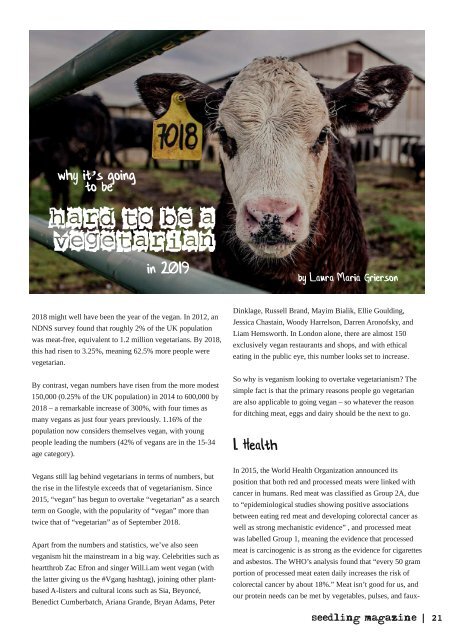Seedling Magazine
Seedling is a new digital magazine aimed at making the world a better place. Read about sustainability, spirituality, nature, personal growth and more - all from a vegan perspective!
Seedling is a new digital magazine aimed at making the world a better place. Read about sustainability, spirituality, nature, personal growth and more - all from a vegan perspective!
You also want an ePaper? Increase the reach of your titles
YUMPU automatically turns print PDFs into web optimized ePapers that Google loves.
In 2015, the World Health Organization announced its<br />
position that both red and processed meats were linked with<br />
cancer in humans. Red meat was classified as Group 2A, due<br />
to “epidemiological studies showing positive associations<br />
between eating red meat and developing colorectal cancer as<br />
well as strong mechanistic evidence” , and processed meat<br />
was labelled Group 1, meaning the evidence that processed<br />
meat is carcinogenic is as strong as the evidence for cigarettes<br />
and asbestos. The WHO’s analysis found that “every 50 gram<br />
portion of processed meat eaten daily increases the risk of<br />
colorectal cancer by about 18%.” Meat isn’t good for us, and<br />
our protein needs can be met by vegetables, pulses, and fauxwhy<br />
it’s going<br />
to be<br />
hard to be a<br />
vegetarian<br />
in 2019<br />
by Laura Maria Grierson<br />
2018 might well have been the year of the vegan. In 2012, an<br />
NDNS survey found that roughly 2% of the UK population<br />
was meatfree, equivalent to 1.2 million vegetarians. By 2018,<br />
this had risen to 3.25%, meaning 62.5% more people were<br />
vegetarian.<br />
By contrast, vegan numbers have risen from the more modest<br />
150,000 (0.25% of the UK population) in 2014 to 600,000 by<br />
2018 – a remarkable increase of 300%, with four times as<br />
many vegans as just four years previously. 1.16% of the<br />
population now considers themselves vegan, with young<br />
people leading the numbers (42% of vegans are in the 1534<br />
age category).<br />
Vegans still lag behind vegetarians in terms of numbers, but<br />
the rise in the lifestyle exceeds that of vegetarianism. Since<br />
2015, “vegan” has begun to overtake “vegetarian” as a search<br />
term on Google, with the popularity of “vegan” more than<br />
twice that of “vegetarian” as of September 2018.<br />
Apart from the numbers and statistics, we’ve also seen<br />
veganism hit the mainstream in a big way. Celebrities such as<br />
heartthrob Zac Efron and singer Will.i.am went vegan (with<br />
the latter giving us the #Vgang hashtag), joining other plantbased<br />
Alisters and cultural icons such as Sia, Beyoncé,<br />
Benedict Cumberbatch, Ariana Grande, Bryan Adams, Peter<br />
Dinklage, Russell Brand, Mayim Bialik, Ellie Goulding,<br />
Jessica Chastain, Woody Harrelson, Darren Aronofsky, and<br />
Liam Hemsworth. In London alone, there are almost 150<br />
exclusively vegan restaurants and shops, and with ethical<br />
eating in the public eye, this number looks set to increase.<br />
So why is veganism looking to overtake vegetarianism? The<br />
simple fact is that the primary reasons people go vegetarian<br />
are also applicable to going vegan – so whatever the reason<br />
for ditching meat, eggs and dairy should be the next to go.<br />
1. Health<br />
seedling magazine | 21





